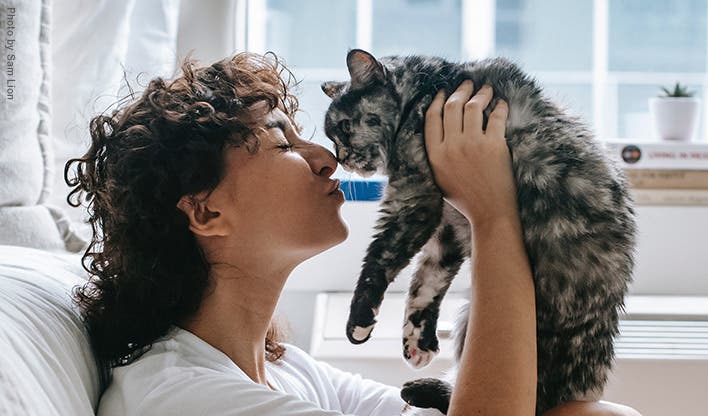Cat ownership doubles the risk of developing schizophrenia, study finds
Researchers suggest that having a beloved cat as a pet might potentially double a person’s risk of developing schizophrenia-related disorder

Researchers suggest that having a beloved cat as a pet might potentially double a person's risk of developing schizophrenia-related disorders. (CREDIT: Creative Commons)
In a startling revelation, a new review conducted by Australian researchers suggests that having a beloved cat as a pet might potentially double a person's risk of developing schizophrenia-related disorders. This revelation has ignited discussions and concerns about the enigmatic relationship between feline companionship and mental health.
The comprehensive analysis, led by psychiatrist John McGrath and his team at the Queensland Centre for Mental Health Research, delved into 17 studies spanning over four decades, originating from 11 different countries, including the United States and the United Kingdom. The aim was to unravel the perplexing link between cat ownership and the incidence of schizophrenia-related conditions.
"We found an association between broadly defined cat ownership and increased odds of developing schizophrenia-related disorders," states Dr. John McGrath, the lead author of the study. This discovery has sparked a resurgence of interest in a hypothesis first proposed in a 1995 study: the notion that exposure to the parasite Toxoplasma gondii, commonly found in cats, could be a potential trigger for schizophrenia.
Toxoplasma gondii, a mostly innocuous parasite, is transmitted through various means, including undercooked meat and contaminated water. However, the most intriguing transmission route is through contact with an infected cat or its feces.
It is estimated that a staggering 40 million people in the United States alone may be harboring this parasite, often without experiencing any discernible symptoms. Nevertheless, researchers have been continually uncovering peculiar effects associated with T. gondii infections.
Once within the human body, T. gondii has the capacity to infiltrate the central nervous system and influence neurotransmitters. Over time, this parasite has been linked to a range of alterations in personality, the emergence of psychotic symptoms, and the development of certain neurological disorders, including schizophrenia.
However, it's crucial to note that the mere presence of an association between cat ownership and schizophrenia-related disorders doesn't definitively establish causation, nor does it confirm that the parasite was transferred from a cat to a human.
Related Stories
The extensive analysis of 17 studies yielded a compelling result: "a significant positive association between broadly defined cat ownership and an increased risk of schizophrenia-related disorders."
Even after adjusting for covariates, the researchers found that individuals exposed to cats had approximately twice the odds of developing schizophrenia.
However, a few important caveats should be considered when interpreting these findings. Fifteen out of the 17 studies examined were case-control studies, which cannot definitively prove a causal relationship and often fail to account for factors that may have influenced both the exposure and the outcome.
Moreover, a notable number of the studies reviewed were deemed of low quality, a limitation acknowledged by the authors themselves.
The consistency of the findings across the various studies also raises questions. While higher-quality studies pointed to associations in unadjusted models, these links might have been influenced by other factors that were not accounted for in the analyses.
One study, for instance, found no significant association between cat ownership before the age of 13 and the later development of schizophrenia. However, it did uncover a notable link when cat ownership was narrowed down to a specific age range (ages 9 to 12), suggesting that the critical time frame for cat exposure remains elusive.
In the United States, a study involving 354 psychology students failed to establish a connection between cat ownership and schizotypy scores. Nevertheless, those who had experienced a cat bite exhibited higher scores compared to those who had not, hinting at a potential role of cat-related incidents in influencing mental health outcomes.
Yet another study, encompassing individuals with and without mental disorders, unearthed a connection between cat bites and elevated scores on tests measuring specific psychological experiences. Intriguingly, the researchers propose that other pathogens, such as Pasteurella multocida, may be responsible for these effects instead.
Dr. McGrath and his team caution against jumping to conclusions based solely on their findings. They emphasize the pressing need for more rigorous and extensive research before definitively establishing a causal relationship between cat ownership and schizophrenia-related disorders.
"In conclusion, our review provides support for an association between cat ownership and schizophrenia-related disorders," the authors write. "There is a need for more high-quality studies, based on large, representative samples to better understand cat ownership as a candidate risk-modifying factor for mental disorders."
The intriguing findings of this study, published in Schizophrenia Bulletin, have opened a new chapter in the complex and mystifying relationship between our feline companions and the human mind.
As we ponder the potential implications of these results, it becomes evident that further research is crucial to unravel the enigma surrounding cat ownership and its influence on mental health. Until then, cat lovers and mental health advocates alike await more concrete answers regarding the potential risks and benefits of sharing our lives with these furry friends.
For more science stories check out our New Discoveries section at The Brighter Side of News.
Note: Materials provided above by The Brighter Side of News. Content may be edited for style and length.
Like these kind of feel good stories? Get the Brighter Side of News' newsletter.
Joseph Shavit
Head Science News Writer | Communicating Innovation & Discovery
Based in Los Angeles, Joseph Shavit is an accomplished science journalist, head science news writer and co-founder at The Brighter Side of News, where he translates cutting-edge discoveries into compelling stories for a broad audience. With a strong background spanning science, business, product management, media leadership, and entrepreneurship, Joseph brings a unique perspective to science communication. His expertise allows him to uncover the intersection of technological advancements and market potential, shedding light on how groundbreaking research evolves into transformative products and industries.



